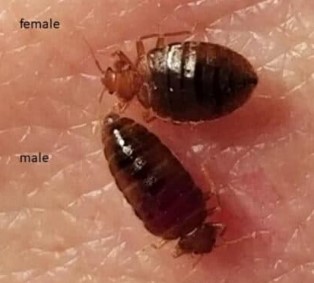One bed bug is a clear sign that there could be more, but it doesn’t mean you have an infestation especially if you’ve just arrived from outside. However, if you’ve been indoors for a few days and one bed bug appears, it may be a good idea to give the house a thorough search to confirm whether there are signs of other bed bugs.
In this article, we will discuss whether one bed bug can cause an infestation and support it with hour bed bugs reproduce. We will also look at the rate at which bed bugs multiply to help you understand when an infestation could be too big.
Can One Bed Bug Cause an Infestation?
Yes, one bed bug can cause an infestation if it is a female whose eggs have been fertilized. Most bed bug infestations begin with one or two of them and within a few weeks, they have multiplied into a huge number. Perform thorough search and cleaning to reduce the risk of developing into a full-blown infestation.
A single fertilized female bed bug will lay eggs everywhere hidden such as under mattresses on in bed frames.
If it’s a male, you will definitely end up with an infestation. Unfortunately, you may not be able to tell the difference between male and female bed bugs by just looking at them.
So, assuming the single bed bug you have seen is female, then the situation needs dealing with right away because you could have a bug infestation in a couple of weeks.
Here is what makes one bed bug a source of an entire colony.
Bed Bugs Lays Many Eggs
A single female lays about 1-5 eggs daily. That means it can spread up to 500 eggs in different places of a house in its lifetime. These eggs will often hatch in 6-10 days when conditions are right.
But how long do bed bugs live? Bed bugs can live for 60 – 120 days depending on how favorable the conditions are for them.
Having all that information in the picture, one bed bug can lay at least 200 eggs within 4 months.
An exponential growth where newly hatched bed bugs find sufficient blood meal, grow fast, and lay more eggs is a common scenario. There is no evidence of not having an infestation because the first bed bug was female.
Do Males and Females Bed Bugs Look Different?
Finding a male bed bug should not worry you. This is because these males don’t lay eggs. Females on the other hand a danger. Once a female has mated with a male, it can carry the sperm throughout its entire lifetime, laying eggs that are fertilized all the time.

So, one female bed bug can cause a big infestation in your entire home.
The anatomy of male and female bed bugs is almost similar. However, you can easily tell a male from a female if you’re experienced in dealing with bed bugs. The body (abdomen) of a female bed bug is usually round while the body of a male one tends to be more pointed.
It is impossible to tell the difference by looking at their skin. Also, while still young, no one can really tell which ones are male or which ones are female.
Bed Bug Fertilization
Bed bugs reproduce by traumatic insemination. By traumatic insemination, we’re referring to a process where the male stabs the female’s abdomen with its specialized reproductive organ. The organ is hardened enough to pierce the female abdomen, and it is called the spermalege.
The spermalege causes damage and wound to the females but they have also evolved to survive and lay eggs after such a cruel reproductive process.
Once the eggs hatch, they immediately begin looking for a blood meal and bite just like the adult ones. The faster they can find food, the faster they will grow and also become parents to the next generation of bed bugs.
Therefore, when there is enough blood meal, one female bed bug laying fertilized eggs can cause a seriously huge infestation within a very short time.
The nymphs (baby bed bugs) can live for quite a long time, usually several weeks without food.
How to Reduce Bed Bug Reproduction Cycle and Prevent Infestation
First, if you find one bed bug, kill it instantly because you’re not sure whether it is male or female.
The answer to breaking their reproduction cycle lies with the eggs. If you can stop the eggs, you can stop the infestation. To kill the eggs, use isopropyl alcohol or bleach by applying it over the areas suspected to have the bugs. Alternatively, call a bed bug expert who will perform a treatment for your home and prevent their multiplication.
Researchers have reported that they are working on how to minimize their reproduction by stopping males from mating. This method uses an alarm pheromone that their nymphs release.
The pheromone discourages males from attempting to mate with female bed bugs.

